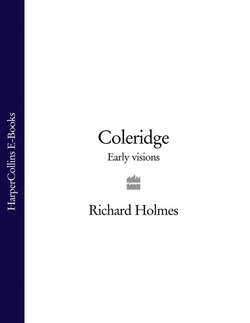Читать книгу Coleridge: Early Visions - Richard Holmes - Страница 44
11
ОглавлениеBut what was his duty now? London, Cambridge, Bath, Wales, America – in which direction should he go? How could he best pursue the Pantisocratic dream? Coleridge sat on in the snug at the Salutation & Cat, smoking and drinking and talking with Lamb, in a haze of indecision, into the New Year 1795. Southey, sweeping aside delicacies, insisted that he must come to Bath immediately. Coleridge replied, in a fantastical letter, that he would come down “helter skelter” on a local farm cart, the two-mile-an-hour “Flying Wagon”, wrapped up in hay, “fraternizing” with the calves, and well supplied with gin and oronoko. “I shall be with you by Wednesday [7th January], I suppose.”73
Southey took this proposal literally, and was full of amazed indignation when, having walked to Marlborough with Lovell to intercept the Flying Wagon, it failed to deliver its Pantisocratic contents. By 11 January he was himself in London, “to reclaim his stray”, who even then proved elusive. “I went to the Salutation and Cat – a most foul stye – no Coleridge,” he told Edith Fricker. “I went to Christ’s Hospital…where is Coleridge?” Finally he was located with Lamb in the Unitarian Chapel, seeking divine guidance. They had a difficult dinner together.
“Coleridge objected to Wales and thought it best to find some situation in London till we could prosecute our original plan. He talks of tutorage – a public office – a newspaper one for me. I went to bed in dirty sheets – and tost and turned, cold, weary and heart sick till seven in the morning.”74 It was a low moment for Pantisocracy. Southey’s letter shows how much he counted on Coleridge’s support, increasingly anxious about his own marriage to Edith, his retreating work prospects, and the financial difficulties at Bath. It was this appeal to Coleridge’s generosity and easy good nature, as much as any bullying over Sara Fricker, that finally convinced Coleridge that his Pantisocratic “duty” lay in the West Country. By the end of January 1795 his university degree, his career at the Bar, his London journalism were all abandoned. The three Pantisocrats – Coleridge, Southey and Burnett – were established in their first commune, a cramped apartment at 25 College Green, Bristol.
